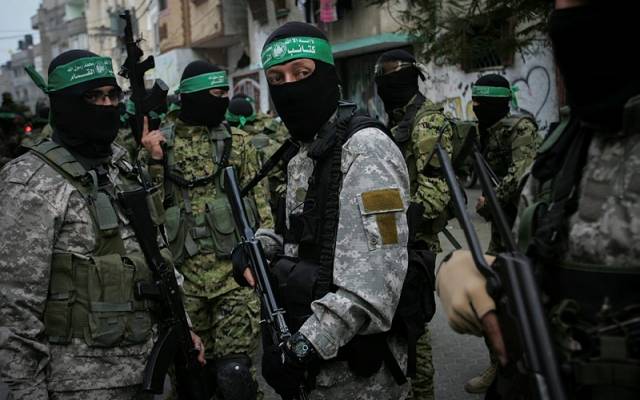The US Department of the Treasury in early September announced that it had sanctioned a list of terror leaders from several organizations, including from Hamas and Iran’s Quds Force, many of whom are lurking in nearby Muslim countries.
By Baruch Yedid, TPS
The Treasury Department’s Office of Foreign Assets Control (OFAC) stated it utilized newly enhanced counterterrorism measures to sanction 15 terrorist leaders, facilitators, and entities, including individuals from the Islamic State (ISIS), al-Qaeda, and Iran’s Islamic Revolutionary Guard Corps Quds-Force (IRGC-QF).
Hamas leader Zaher Jabarin was one of the officials sanctioned. Turkey-based Jabarin is the head of Hamas’ finance office. He manages Hamas’ yearly budget amounting to tens of millions of dollars, is in charge of all Hamas’ income from various elements around the world, and seeks additional sources of funding for Hamas.
According to the State Department, Jabarin was focused on developing a financial network in Turkey that would allow Hamas to raise, invest, and launder money before transferring it to terror networks in Gaza, Judea and Samaria.
Jabarin has also served as the primary point of contact between Hamas and Iran’s Quds Force. Since 2017, there has been growing contact between IRGC-QF and Hamas officials focused on increased funding from Iran.
An in-depth investigation by TPS into Hamas’ operations in Turkey exposed an elaborate network of senior terrorists who work around the clock to promote terrorism against Israeli targets while operating unhindered on Turkish soil.
The investigation revealed that Jabarin is only one of several senior operatives conducting Hamas’ terrorist activities from abroad.
The operatives include Jihad Ya’more, who participated in the kidnapping of IDF soldier Nachshon Waxman; Jabarin, the finance wizard; Salameh Mara’i, Abdel Hakim Hanini and Mahmoud Atton, all former imprisoned terrorists who were released in the 2011 Shalit Deal. The senior terrorists are well established in Turkey and work on Hamas’ master plan for the terror group’s military buildup.
Turkey
Hamas’ headquarters in Turkey focuses on military buildup and terrorism. Its divisions are responsible for procurement, development and recruitment. Its activities in Turkey and Lebanon are a complicated mission and, to that end, the former Hamas prisoners have set up Hamas’ military administration and terror management.
The HQ is subordinate to Saleh al-Aruri, number two in Hamas and the commander of all military activities. Majd Khader, one of Hamas’ shadow lieutenants, commands the HQ with the assistance of Muhammad Salim and Rabiya Mustafa.
Hamas’ “construction administration” (Dairat al-E’emar) in Turkey is active in the fields of intelligence, operations, personnel security, information security, logistics, planning, training and production, and is responsible for the procurement and development of advanced weapons, fundraising and terrorist financing.
Hamas’ efforts to equip itself with rockets and Unmanned Aerial Vehicles (UAV) are also at the center of its activities.
The production department in the administration works to acquire knowledge and means for rocket and UAV development.
The intelligence division is tasked with accumulating targets for potential attacks.
Logistics oversees smuggling operations, office space management and the acquisition of the required installations.
The finance department is a huge mechanism for paying salaries and purchasing equipment and technology. The department has offices in Istanbul and Lebanon, where the directorate operates training centers.
Before the establishment of the directorate in Turkey, Hamas operated secretly under the name of the “Office for Labor” in Lebanon and Syria, under Jabarin’s and Majed Khader command, both of whom left Syria and settled in Turkey.
Nasser Melawah and Hamed Tamuni are also in Turkey on behalf of “The Office.”
The organization was linked to Professor Jamil Tekali of Turkey, who was arrested by Israel in 2017 while visiting the Al Aqsa mosque in Jerusalem. Tekali, who was recruited by Jabarin, helped Hamas establish itself in the country by obtaining visas, residentia real estate, commercial properties, and vehicles, in addition to registering companies in his name.
His mission in Israel was to transfer funds to Hamas entities.
Muhammad Dar’am from Umm al-Fahm in Israel, recruited to Hamas by Jabarin and Salameh Ma’rai, was also released in the Shalit Deal. Dar’am acts under the auspices of Hamas’ IMES Company and is tasked with transferring funds from Turkey to Judea and Samaria.
Hamas forged ties with the SADAT Company, which was established by former military officers with ties to Erdogan, including Adnan Basha, a general who was expelled from the military over his ties with extreme elements.
Turkish companies serve Hamas’ interests. Some are owned by senior Hamas officials and money changers in Lebanon help launder the funds.
Two members of the production division in the directorate, Ahmed Shabana from the Palestinian Authority (PA) and Muhammad Koteley from Syria, own the Turkish FARKED company.
Guns and Money
Hamas’ HQ for its terror operations in Judea and Samaria works out of Turkey.
Rami Akraa, sitting in Istanbul, is responsible for some of the terror operations in Judea and Samaria, and Ayman Abu Khalil, also in Istanbul, is responsible for the transfer of funds.
Aruri left Turkey in 2017 and currently resides in Beirut and is in contact with Hezbollah and the Iranians.
Turkish President Recep Tayyip Erdogan shares a similar ideology with the Muslim Brotherhood and Hamas, and after having been expelled from Syria, Hamas’ leaders have taken refuge in Turkey and have been working unimpeded.
Since Hamas took over the Gaza Strip in 2007, Turkey has expanded its ties with the terror organization and has had direct talks with its top representatives Khaled Mashal and Ismail Haniyeh.
Dr. Ehud Rosen, of the Jerusalem Center for Public Affairs, underscored Turkey’s central place alongside Qatar in supporting and promoting radical Sunni Islam, including Hamas, the Muslim Brotherhood, and Salafists and jihadists related to global terrorism.
In many cases, the support comes through semi-official bodies or “civil society” bodies close to Turkey’s ruling party, as well as hosting key personalities and bodies, communication channels, international conferences and more, he explained.
Pinchas Inbari, a veteran Arab affairs correspondent and an analyst for the JCPA, explained that the reason for Turkey’s policy is rooted in Erdogan’s strategic goals to re-establish the Ottoman Empire by strengthening the World Muslim Brotherhood and its Qatari-funded leadership.
He said that Erdogan is working to spark the imagination of devout Sunnis and is concentrating on Jerusalem and its mosques and has abandoned Gaza.
Israel recently submitted an official complaint about Hamas’ activities in the country. Arab sources report that while Turkey has refused to accept Israel’s appeal, it did demand that Hamas provide explanations for its actions.
The sources further reported that Israel has pledged not to harm Hamas on Turkish soil if Turkey takes action against the terrorist organization. Hamas has disputed Turkey’s demand that it come clean about its activities.
Several sources reported that the agreement between Turkey and Hamas stipulates that Hamas must limit its activities to diplomatic issues and refrain from promoting terrorism in Turkey.
Lebanon
Hamas has two special projects operating in Lebanon, part of its wide-ranging effort to establish semi-military forces and to acquire and develop advanced weapons. This operation is also run by the administration in Turkey.
The first project is the Khaled Ali Units whose role is to recruit fighters and purchase weapons.
The second unit is the Northern Unit, which deals with rocket procurement, fighter training and terrorist planning, the development of military naval capabilities, including the purchase of diving equipment and light boats. The northern unit operates from various offices in Lebanon’s coastal cities.
One of the projects operated by the Khaled Ali units is the Saad Project,”which aimed to develop missiles and rocket. Mustafa Hijazi is responsible for the project, along with his brother Hamza and Mohammed Malak, all residents of Lebanon. Muhammad Amis is also a member of the Khaled Ali units.
The Northern Unit also consists of Hamas operatives in Lebanon, and especially in Tyre, Sidon and Beirut. The unit specializes in maritime warfare. Tugiq Aysha and Barah Farhat of Tyre are central operatives. Khalil Azem is responsible for intelligence. Unit members Nadim Ahmad Nasser, Arafat Odeh, Ahmad Salah Naji and Salah Mustafa are all residents of Lebanon.
The Northern Unit and the Khaled Ali Units appear to be part of a plan that has already been exposed in the Arab media and attributed to Iran’s General Qassem Suleimani, commander of Iran’s al-Quds Force, who persuaded Hezbollah’s leader to join him with Hamas leaders, and chiefly Saleh Aruri and Osama Hamdan, for this purpose.
The Arab media reported a plan for the establishment of the Return Army consisting of 3000 fighters from Lebanon, by Hezbollah officers and indeed with heavy and light weapons and rockets, as part of the coordination between Hamas and Hezbollah. The idea was to secure a second front against Israel, by Hamas, strengthening its power in Lebanese refugee camps, enriching Hamas’ knowledge and more.
Arab sources have reported in recent years that the “Ministry of Labor” under Majed Khader has been acting in concert with Hezbollah, but other sources indicate that some of his actions were unknown to Hezbollah and certainly not to the state of Lebanon, which fears that Hamas activity in its territory would bring Israel to take action against it, as happened in early 2017 with the attempt to eliminate Muhammad Hamdan, the brother of Osama Hamdan, a senior Hamas official. Sources claim that Hamdan’s assassination attempt in Lebanon is the result of Hamas’s “Ministry of Labor” exposure by Israeli intelligence.
All the activities described here are made possible, in part, by a network of companies and money exchangers, most of whom operate in Lebanon and assist in the transfer of terror money for hefty commissions. In May this year, Israel eliminated Ahmad Khodri, a resident of Shaja’iyeh in the Gaza Strip, who was ientified as “Hamas’ financier.” Sources indicate that Khodri was responsible for the transfer of funds from abroad to Hamas accounts.
Do You Love Israel? Make a Donation - Show Your Support!
Donate to vital charities that help protect Israeli citizens and inspire millions around the world to support Israel too!
Now more than ever, Israel needs your help to fight and win the war -- including on the battlefield of public opinion.
Antisemitism, anti-Israel bias and boycotts are out of control. Israel's enemies are inciting terror and violence against innocent Israelis and Jews around the world. Help us fight back!




